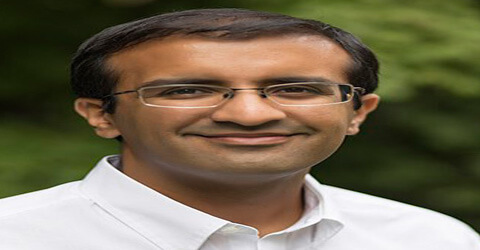Dr Raj Panjabi is a renowned Physician, Social Entrepreneur and Professor. He is the Co-Founder and CEO of Last Mile Health which tackles the ‘last mile’ — the final, critical step of delivering products or services to consumers — a conundrum for businesses in health care, where last-mile problems hit poor regions especially hard, according to the organization’s website. Dr Panjabi is also an Assistant Professor of Medicine at the Division of Global Health Equity at Brigham and Women’s Hospital and Harvard Medical School. President Joe Biden appointed Dr Raj Panjabi as the U.S. Global Malaria Coordinator for the President’s Malaria Initiative in February 2021.
Born in Monrovia (the capital of Liberia), Dr Panjabi continues to have his roots in India. Dr Panjabi recalled, “When I was 9, the civil war broke out. Charles Taylor’s rebel army marched on Monrovia. Some foreign embassies organized evacuation flights. My mother told me to pack one bag.”
He continued, “At the airport, foreign nationals were separated from Liberians and allowed to board outgoing flights. Liberians were not. My family and I were stuffed into the cargo section of this old military airplane. The hatch was left open, and I could see other Liberians, including soldiers, trying to escape. Leaving those people on the tarmac was something I never forgot.”
The family first shifted to Sierra Leone, a country in West Africa, and eventually found their way to the United States. Dr Panjabi went to the University of North Carolina and had a plan to go to medical school and practice at High Point.
However, Dr Panajabi recalled, “Then came Sept. 11. It brought back memories of Liberia and got me thinking about the roots of extremism. I also read Paul Farmer’s book, ‘Pathologies of Power,’ which made me realize that medicine could be a way to bridge inequality, one cause of extremism. Soon I was rethinking my future. I wanted to go back to West Africa and find a way to serve those I’d left behind.”
He started working towards his goal and researched programs that had brought health care to the rural poor. While in medical school, he had the opportunity to travel to Alaska, where the Community Health Aide Program had achieved great success and enabled access to the most remote places. The goal was accomplished by training locals to become health aide providers.
In 2005, Dr Panjabi took his fiancée, Amisha Raja — his now-wife — to see the place he grew up in – Liberia. They visited the country in the wake of the civil war when there were only 51 doctors available in the entire country. They soon volunteered themselves.
Dr Panjabi recalled, “The first patient I saw, a newborn, died of pneumonia in my arms. I’d never seen anything like that before. The mother had lived too far from the clinic to get prenatal care.”
When the couple returned to the United States, Dr Panjabi instantly got back to finding solutions to the dilemma they had experienced in Liberia. He wrote a proposal to start a clinic based on what he had observed in the state of Alaska.
Dr Panjabi said, “Amisha and I raised the funds for Last Mile Health at our wedding. Instead of a gift registry, we asked people to donate cash. We got $6,000, enough to hire and train 30 community health workers. As of today, we have over 500 working directly for us.”
The minister of health in Liberia greatly supported their cause. Liberia was then headed by Ellen Johnson Sirleaf, Africa’s first elected woman president, who was open to new ideas and solutions.
In Liberia, Panjabi and Last Mile Health teamed up with the Ministry of Health, working alongside its partners, including PMI, USAID, CDC, and the Global Fund for AIDS, Tuberculosis, and Malaria, among others, to train and support the nation’s community health workforce to increase access to malaria testing and treatment in rural and remote communities. According to Dr Panjabi, smartphones can connect supervising nurses at clinics to lay workers who can follow instructions accordingly.
Dr Panjabi and the Last Mile Health team also played a crucial role in the West Africa Ebola epidemic in 2013-2016; he helped train over a thousand health workers and supported the Government of Liberia to lead its national Ebola Operations Center. Dr Panjabi delivered his testimony on the Ebola epidemic at the U.S. Senate Foreign Relations Subcommittee.
Dr Panjabi faced some resistance amongst peers; he said, “However, the general rhetoric among local professionals was that it was not possible to provide health care in the rural areas — so why try? What these critics didn’t recognize was how new technologies had changed things.”
Among his many accomplishments, Dr Panjabi has authored and co-authored over 50 publications. He is a Gavi Champion and a member of the International Advisory Group for Frontlines First at the Global Financing Facility and has served on the External Review Group for the WHO’s guidelines on community health worker programs. Dr Panjabi was named by TIME as one of the 100 Most Influential People in the World and one of the 50 Most Influential People in Healthcare. He has been listed as one of the World’s 50 Greatest Leaders by Fortune.
The U.S. President, Joe Biden, has newly appointed Dr Panjabi as the Malaria Coordinator for the country. Speaking on the subject, Dr Panjabi wrote, “I’m privileged to serve with and learn from the teams at PMI, USAID, CDC and our partners. Together, we will fight malaria. We will save lives. We will build health systems.” The country is confident that his efforts will succeed and get rid of the parasite permanently.
In conclusion, Dr Panjabi says, “I believe we are not defined by the crises we face, but by how we respond. Ending malaria, one of history’s deadliest pandemics, within our generation will inspire hope. And hope is worth fighting for.”







